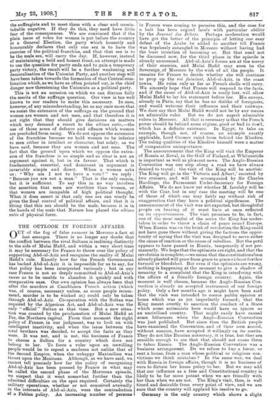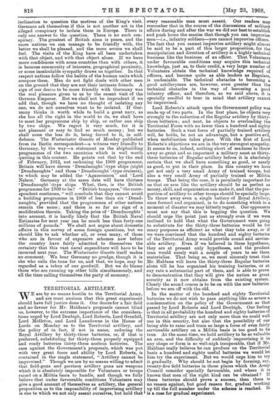THE OUTLOOK IN FOREIGN AFFAIRS.
OUT.of the fog of false rumour in Morocco a fact at last emerges. There is no longer any doubt that the conflict between the rival Sultans is inclining distinctly to the side of Mulai Hafid, and within a very short time it- may be necessary for France to throw over the policy of supporting Abd-ul-Aziz and recognise the reality of Mulai Hafid's rule. Exactly how far the French Government has backed Abd-ul-Aziz it is impossible for us to say, for that policy has been interpreted variously ; but in any case France is not so deeply committed to Abd-ul-Aziz's cause as to be unable to abandon it quickly and with comparative case. Our own opinion has always been that after the murders at Casablanca French action (which was, of course, necessary unless, as some people recom- mend, murder is to be winked at) could only be taken through Abd-ul-Aziz. Co-operation with the "Sultan was required by the Algeciras Act, and Abd-ul-Aziz was the only " official " Sultan at that time. But a new situa- tion was created by the proclamation of Mulai Hafid at Fez, the Northern capital. From that moment the right policy of France, in our judgment, was to look on with intelligent inactivity, and when the issue between the rival brothers was decided, to accept the facts as they were. It was not, and is not, the business of France to choose a Sultan for a country which does not belong to her. To force a ruler upon an unwilling people would be to repeat a madness not unlike that of the Second Empire, when the unhappy Maximilian was thrust upon the. Mexicans. Although, as we have said, we cannot tell precisely how far the policy of recognising Abd-ul-Aziz has been pressed by France in what may be called the second phase of the Moroccan episode, we suspect that it went somewhat further than the admitted difficulties on the spot required. Certainly the military operations, whether or not conceived avowedly in the interests of Abd-u1-.Aziz, were the contradiction of a Fabian policy. An increasing number of persons in France were coming to perceive this, and the case for a halt has been argued lately with particular ability by the Journal des Debate. Perhaps moderation would have got the better of the principle of letting. one easy defeat of the Arabs be added to another till France was hopelessly entangled in Morocco without having had the least intention of becoming so. But that need not be discussed now, for the third phase in the episode is already announced. Abd-ul-Aziz's forces are at the mercy of their enemies, and Mulai Hafid may soon be the Sovereign, of Morocco by the wish of all the people. It remains for France to decide whether she will continue .
to prop up the roi faineant, Abd-ul-Aziz, in the coast towns. He rules only as far as French shells will carry. We sincerely hope that France will respond to the facts, and if the cause of Abd-ul-Aziz is really lost, will allow Mulai Hafid to lay his statement before her. His envoys, already in Paris, say that he has no dislike of foreigners, and would welcome their influence and their railways. We dare say that Mulai Hafid would not be by any means an admirable ruler. But we do not expect admirable rulers in Morocco. All that is necessary is that the French power should. be behind some regime, good or bad in itself, which has a definite existence. In Egypt, to take an example, though not, of course, an example exactly applicable, Lord Cromer ruled from behind the Khedive. The ruling qualities of the Khedive himself were a matter of comparative unimportance.
The announcement, that the King will visit the Emperor of Russia at Reval, in the Gulf of Finland, at Whitsuntide is important as well as pleasant news. The Anglo-Russian Convention was one step along a road we have always desired to travel ; the visit of the King will be another.
The King will go in the Victoria and Albert,' escorted by two cruisers, and will be accompanied by Sir Charles Hardinge, the Permanent Under-Secretary for Foreign Affairs. We do not know yet whether M. Isvolsky will be • with the Czar, but in any case the meeting will be one of those of which one may fairly say without risk of exaggeration that they have a political significance. The announcement of the visit was not expected, but thoughtful people on hearing of it must have at once reflected on its opportuneness. The visit promises to begin fact, one of the most useful of the series the King has under- taken in order to throw a chain of peace round Europe. When Russia was on the brink of revolution the King could not have gone there without giving the factions the oppor- tunity of saying that the visit was designed to serve either the cause of reaction or the cause of rebellion. But the peril appears to have passed in Russia, temporarily if not per- manently. We hope that the optimists are right, and that the revolution is complete,—we mean that the constitutionalism already planted will grow from grace to graces i thou t fur ther turmoil or bloodshed. But even if the optimists are wrong, nothing is happening at the moment to give a shadow of meaning to a complaint that the King is interfering with the affairs of a friendly foreign country. Again, the moment is well chosen, because the Anglo-Russian Con- vention is already an accepted instrument of our foreign policy. Only a few months ago it might have been said that the visit was intended to coerce public opinion at home which was as yet imperfectly formed ; that the King meant overtly to sanction the conduct of a State which some extremists here would. have us ignore as an uncivilised country. That might easily have caused some bitterness when the Anglo-Russian Convention was just published. But since then the British people have examined the Convention, and of their own accord, without suasion, have accepted it willingly on its merits. They do not like Russian autocracy, it is true, but they are sensible enough to see that that should not cause them to taboo Russia. The Anglo-Russian Convention was a business arrangement. Do we refuse to buy a horse, or rent a house, from a man whose political or religious con- victions we think mistaken ? In the same way, we deal with Russia in foreign affairs, though it is no business of ours to dictate her home policy to her. But we may add that our influence as a free and Constitutional country is likely to be far more potent when we are friendly with her than when we are not. The King's visit, then, is well timed and desirable from every point of view, and we are sure that the country will applaud his resolve to go. Germany is the only country which shows a Slight inclination to question the motives of the King's visit. Germans ask themselves if this is not another act in the alleged conspiracy to isolate them in Europe. There is only one answer to the question. There is no such con- spiracy. The greatest of British aims is peace, and the more nations we can manage to be friendly with, the better we shall be pleased, and the more secure we shall feel. The visits of the King have all been undertaken with that object, and with that object alone. If we have mere confidences with some countries than with others, it is because community of interests, geographical proximity, or some incalculable sympathy draws us together. In that respect nations follow the habits of the human units which compose them. Men do not fight duels with other men on the ground that they are not their intimate friends. A sign of our desire to be more friendly with Germany was the real pleasure given to us by the recent visit of the German Emperor. But we shall-not be imprudent if we add that, though we have no thought of isolating any one, we do not ourselves want to be isolated. If Ger- many thinks it worth while to build a great navy, as she has all the right in the world to do, we shall have to meet her programme ship by ship, or rather one ship by two ships. We regret it very much, for it is not pleasant or easy to find so much money ; but we shall none the less do it, being forced to it, in self- defence. The Westminster Gazette of Monday published from its Berlin correspondent—a witness very friendly to Germany, by the way—a statement on the shipbuilding programmes of the two countries which is well worth quoting in this context. He points out that by the end of February, 1912, not reckoning the 1909 programme, Britain will have eleven Dreadnought %type ships (eight Dreadnoughts ' and three Dreadnought '-type cruisers), to which may be added the Agamemnon ' and Lord Nelson.' Germany at the same date will have thirteen `Dreadnought %type ships. What, then, is the British programme for 1909 to be? "British taxpayers," the corre- spondent continues, " will conclude that they cannot avoid a building programme in 1909 of less than six Dread- noughts,' provided that the programmes of other nations remain the same ; and there is so far no sign of a modification therein. Taking the price of Dreadnoughts ' into account, it is hardly likely that the British Naval Estimates for next year can be much less than forty-one millions of pounds." We shall not argue about domestic affairs in this survey of some foreign questions, but we should like to ask whether all, or even many, of those who are in favour of expensive schemes now before the country have fairly admitted to themselves the certainty that this vast naval expenditure will have to be incurred next year. The Westminster Gazette itself makes no comment. We bear Germany no grudge, though it is she who calls the tune for us, and that, we hope, may be regarded as a token of our goodwill. But we do blame those who are running up other bills simultaneously, and all the time calling themselves the party of economy.







































 Previous page
Previous page